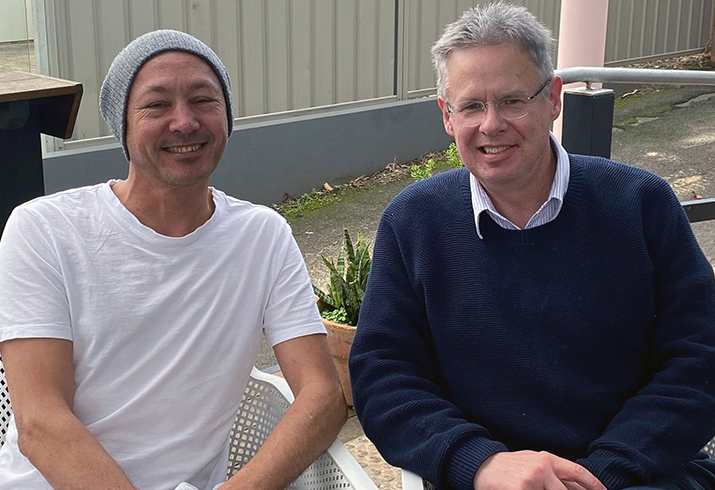Trial drug helps double lung transplant survivor Daniel
 Daniel (left) with Dr Heath
Daniel (left) with Dr Heath
49-year-old Margaret River resident Daniel has lived with cystic fibrosis since birth and has survived through two lung transplants.
Daniel was also able to survive a life-threatening fungal infection thanks to treatment by Fiona Stanley Hospital (FSH) researchers, with the novel antifungal drug, Olorofim.
After catching a virus in 2019, Daniel struggled to breathe and was thankfully a recipient of a second lung transplant. But shortly after, he developed an untreatable fungal infection.
“I had several rounds of antifungals, but the particular infection I had was not treatable with these drugs and my lung function was deteriorating,” Daniel said.
“It was a ‘miracle’ that I could access Olorofim through the FSH trial right when I needed it.”
FSH was the only Western Australian site to provide treatment with the novel antifungal drug, Olorofim in FSH’s now complete ‘032 Study’, which was life saving for Daniel and 4 other patients with IFIs that had previously untreatable and multi-drug resistant (MDR)/extremely drug-resistant (XDR) invasive fungal infections (IFIs).
These patients had not responded to any available licensed antifungal therapies, but thanks to Olorofim access in the 032 Study at FSH, all patients remain well to date.
FSH Dr Christopher Heath – Infectious Diseases Physician & Clinical Microbiologist, is now following on from the successful 032 Study, as the Principal Investigator of the new OASIS study. The study will investigate the efficacy of oral Olorofim for treating invasive aspergillosis, a common IFI, as an oral alternative to the currently used intravenous AmBome treatment therapy.
“As we saw in the 032 study, Olorofim was a lifesaving treatment for patients suffering IFIs from MDR-/-XDR fungal infections, and we are hoping it will have the same efficacy with treating invasive aspergillosis” he said.
“Up until now there have been poor patient outcomes for IFIs from MDR-/ XDR fungal infections, particularly for patients with severe immunodeficiencies, haematological malignancies and / or organ transplantation, where most patients have sadly, died.”
Dr Heath, together with co-investigator Dr Peter Boan, and Dr Moira Wilson, Head of Infectious Diseases, Michelle England Infectious Diseases Research Nurse, the Haematology - Bone Marrow Transplant and Lung Transplant Teams at FSH, are providing hope for an effective treatment for patients suffering IFIs due to these MDR-/-XDR fungal pathogens.
“As in Daniel’s case, this treatment could be the difference between survival or not,” Dr Heath said.
Daniel hopes Olorofim will become more widely available for other IFI sufferers to access.
“I’m really grateful for the simple, healthy life I now lead thanks to Olorofim, and have been able to live to see my son grow up” Daniel said.
The researchers hope that Olorofim will be approved by the FDA in 2024.
The OASIS study is recruiting now and is currently expected to finish in 2025. These studies have been supported by F2G.
This week (28 July to 4 August) is DonateLife week, when Australians are encouraged to register as organ and tissue donors to help people like Daniel. Visit DonateLife (external site) for more information.


